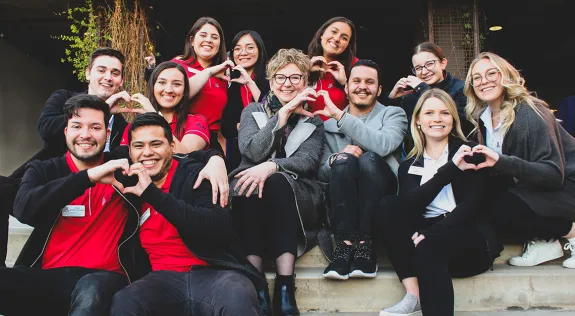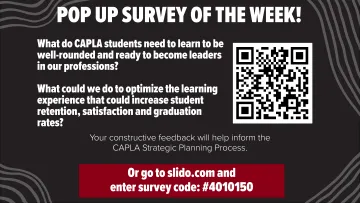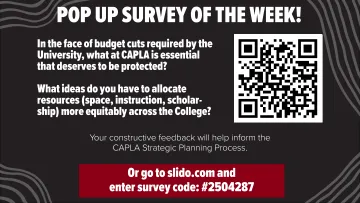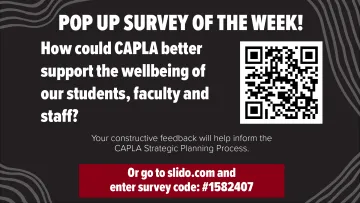
Building a Better World.
Our Strategic Plan
In 2023-2024, the CAPLA community engaged in the development of a new strategic plan designed to guide and steer the college on a path for continued growth, research innovation and community impact.
What students, faculty, staff, alumni and other stakeholders developed together charts a course of success over the next five years and beyond.
We invite you to track our progress as we work toward completing key actions and activities within each of our five strategic priorities.
Our Mission & Vision
To inspire and prepare creators of environments that enrich People, Places, and our Planet.
Our Values
Excellence
Strive to do your best work.
Stewardship
Use resources ethically, fairly and humanely.
Collaboration
Work across disciplines and communities.
Implementation Plan Timeline - Fall 2024
Strategic Priority 1: Putting People First
We will promote a CAPLA culture based on trust, respect and mutual support, the pursuit of work-life balance, and opportunities for career advancement.
Strategic Priority 2: Deliver Diverse Pedagogy for a New Era
We will deliver an innovative curriculum tightly integrated with research and outreach that benefits our students, faculty, industries, and communities.
Objective 2A.
Foster interdisciplinary collaboration and innovation, co-learning, and integration of new theories, technologies and opportunities for research into the curriculum.
Actions
Responsibility: ADA, College Curriculum Committee
Timeline: The committee meets in Fall 2024; the first event in Spring 2025
Progress: ADA has drafted a call for participation in the CAPLA Pedagogy Chats. The CC.C discussed it and offered feedback on 12.10.24. ADA will revise the call and share it with Group Operations Team.
Strategic Priority 3: Preparing for a Changing World
We will prepare our students to be well-rounded, with the necessary skills and experiences to become leaders in their professions and fields.
Objective 3A.
Increase our graduates’ placement in work, advanced education, and leadership positions.
Actions
Responsibility: Drachman Institute Director, Directors, program chairs, college curriculum committee
Timeline: Fall 2024
Progress: Course inventory completed by the Director of the Drachman Institute.
Strategic Priority 4: Addressing Global Challenges
We will apply our distinctive regional expertise globally to create more environmentally and socially sustainable futures.
Objective 4A.
Become a leader in built environment research, embracing emerging perspectives, materials, and technologies.
Actions
Responsibility: Dean, ADR, ADSA, ADFA, Directors, DI, CFM
Timeline: Fall 2024/Spring 2025
Progress: Ongoing grassroots symposium; and planned exhibit during Leslie Lokko's Lecture Series in February 2025
Objective 4B.
Identify and address challenges for communities in the Southwest and borderlands (including indigenous and Hispanic), focusing on natural and built environment sustainability and equity topics.
Actions
Responsibility: ADR, DI, Directors, Faculty, Janet
Timeline: Ongoing, Fall 2024/Spring 2025
Progress: Meetings scheduled with Laura Carr, Nancy, Courtney, and the Director of Cooperative Extensions. An update will be provided in Spring 2025.
Responsibility: EDI Committee, ADR, DI, Marketing Director, Directors, Faculty
Timeline: Fall 2024/Spring 2025
Progress: Ongoing
Strategic Priority 5: Strengthen Assets
We will generate, support and manage the financial, human and facility resources necessary to meet our mission
Objective 5B.
Ensure even greater transparency and clarity regarding management of CAPLA’s resources.
Actions
Responsibility: Dean, Operations Team, Business Office, CFM, SAC & Program chairs
Timeline: Ongoing
Progress: Financial taskforce with CFM/SAC. – meetings in place/planned for the All Funds
Monthly reports for the School Directors have been developed and the first monthly review has been completed. Annual report data sent to MarCom and requests for updates in CAPLA commons. Monthly budget presentations to be set starting in the Spring. Project codes agreed upon by academic directors and emails were sent.
Responsibility: HRSC, Operational Team/Supervisors
Timeline: August 2024 to December 2025
Progress: Admin Support Team completed in August 2024
Strategic Plan 2.0 Updates
Weekly Pop-Up Surveys
The weekly Pop-Up Surveys are opportunities for the CAPLA community to provide constructive feedback to the ongoing development of the strategic plan. Please maintain professionalism and civility as you share your ideas. This platform is not the venue to be critical of specific individuals within our CAPLA community.
What do CAPLA students need to learn to be well-rounded and ready to become leaders in our professions?
What could we do to optimize the learning experience that could increase student retention, satisfaction and graduation rates.
Go to slido.com and enter survey code: #4010150.

In the face of budget cuts required by the University, what at CAPLA is essential that deserves to be protected? What ideas do you have to allocate resources (space, instruction, scholarship) more equitably across the College?
Go to slido.com and enter survey code: #2703063

How could CAPLA better support the wellbeing of our students, faculty and staff?
Go to slido.com and enter survey code: #1582407

CAPLA Strategic Planning Input Survey. A survey was developed and shared with faculty, staff, students, and other stakeholders. The electronic survey received nearly 250 responses and the results of the survey are now available for review.
Stakeholder Listening Sessions. Throughout November and early December, we conducted listening sessions with various stakeholder groups. These sessions were designed to gather input on the opportunities and challenges facing the College, as well as the priorities that should be incorporated into the new strategic plan.
- Three sessions were held with students.
- Two sessions were conducted with faculty.
- One session was held with staff.
- One session with alumni and donors.
- One session with industry professionals.
- One with the Futures Council.
Review Listening Sessions Summary
Steering Committee Meetings. The Steering Committee has convened three times – October 23, January 10 and February 6. During these meetings, the Committee reviewed the current CAPLA Strategic Plan that was developed in 2018 and assessed the progress made on that plan. The Steering Committee identified some of the strategic questions facing CAPLA that need answering to define a path for the future. Those questions have since been turned into strategic priorities and five themes have emerged. Members of the Steering Committee are as follows:
- Nancy Pollock-Ellwand, Dean, CAPLA
- Ileyn Godoy, Office Manager
- Angie Smith, Director of Development & Alumni Affairs
- Simon White, Assistant Dean of Finance & Administration
- Courtney Crosson, Director, The Drachman Institute
- Laura Hollengreen, Associate Dean for Academic Affairs
- Lauri Johnson, Director, School of Landscape Architecture and Planning
- Ryan Smith, Director, School of Architecture
- Bo Yang, Associate Dean for Research
- Jeffrey Javier, Director, Marketing and Communications
- Susannah Dickinson, Council of Faculty Members Chair, General Faculty, Associate Professor, Architecture
- Daniel Kuhlmann, Assistant Professor Real Estate Development and Planning
- Kristi Currans, Council of Faculty Members Vice Chair, General Faculty, Associate Professor, Urban Planning
- Bill Mackey, Lecturer, Architecture
- Emilio Romero, Chair of Staff Advisory Council, Alumni and Development Manager
- Laura Jensen, Vice Chair of Staff Advisory Council, Senior Program Coordinator, School of Landscape Architecture
- Danielle DuBois, Academic Coordinator, School of Architecture
- Richard Johnson, Senior Executive Director for Sustainability, Rice University, President Futures Council
- Phil Swaim, Principal, Swaim Associates, Tucson
- Amy Peron, SBE '15 and MLA '18, Senior Associate Norris Design, Tucson
- Diane Jacobs, BArch ‘88, Principal, Holly Street Studios, Phoenix
- Lori Jones Woods, AZ ASLA Southern Section Chair
- Aaron Tsosie, BArch ‘14, SPS+ Architects
- Lena Porel, Lead Planner, Housing & Community Development, City of Tucson
- Daniel Schwab, Student from Landscape Architecture
The Five Strategic Priorities. As a result of the Strategic Planning Steering Committee meetings, the following five strategic priorities have emerged and work groups co-led by faculty and staff are forming to discuss and develop a draft goal, objectives, implementation plans:
| Strategic Priority | Co-Leaders |
| People First: Trust, Transparency & Community | Laura Hollengreen Emilio Romero |
| Strengthening Assets and Financial Stability | Simon White Ryan Smith |
| New Pedagogy for a New Era | Ryan Smith Lauri Johnson |
| Readiness for a Changing World, Industry and Workplace | Kristi Currans Courtney Crosson |
| Addressing Grand Challenges | Bo Yang Susannah Dickinson |
The co-leads are seeking to bring together a diverse group of stakeholders with representation across the College. If you are interested in joining one of the workgroups, please contact the co-leads. The goal for each work group is to present their draft to the Strategic Planning Steering Committee on April 3.
Pop-Up Surveys. Starting February 19, look out for weekly Pop-Up Surveys in your email inbox, on social media, in the Sundt Gallery, and other areas of the College. The Pop-Up Surveys are opportunities for the CAPLA community to provide additional input to the strategic plan. Thank you to all who have been involved so far in the strategic planning process. We can’t wait to reveal the completed Strategic Plan at the end of April.
- Planning Process Design: The Consultant spent much of August and early September interviewing different members of our leadership team, faculty and staff to better understand our unique structure, planning objectives and the resources available to inform the planning process. These conversations informed the consultant’s recommendations for how to design our strategic planning process to ensure multiple and varied opportunities for stakeholder input, while keeping us on track to complete the process by the end of the Spring ’24 semester.
- Formation of a Strategic Planning Steering Committee: Given our size and various perspectives and interests, the Consultant has recommended formation of a diverse steering committee comprised of approximately 25 representatives of our primary stakeholder groups including administrative leadership, faculty, staff, industry, alumni, students and community. We have confirmed the following members:
- Nancy Pollock-Ellwand, Dean, CAPLA
- Ileyn Godoy, Office Manager
- Angie Smith, Director of Development & Alumni Affairs
- Simon White, Assistant Dean of Finance & Administration
- Courtney Crosson, Director, The Drachman Institute
- Laura Hollengreen, Associate Dean for Academic Affairs
- Lauri Johnson, Director, School of Landscape Architecture and Planning
- Ryan Smith, Director, School of Architecture
- Bo Yang, Associate Dean for Research
- Susannah Dickinson, Council of Faculty Members Chair, General Faculty, Associate Professor , Architecture
- Daniel Kuhlmann, Assistant Professor Real Estate Development and Planning
- Kristi Currans, Council of Faculty Members Vice Chair, General Faculty, Associate Professor, Urban Planning
- Bill Mackey, Lecturer, Architecture
- Emilio Romero, Chair of Staff Advisory Council, Alumni and Development Manager
- Laura Jensen, Vice Chair of Staff Advisory Council, Senior Program Coordinator, School of Landscape Architecture
- Danielle DuBois, Academic Coordinator, School of Architecture
- Richard Johnson, Senior Executive Director for Sustainability, Rice University, President Futures Council
- Phil Swaim, Principal, Swaim Associates, Tucson
- Amy Peron, SBE '15 and MLA '18, Senior Associate Norris Design, Tucson
- Diane Jacobs, BArch ‘88, Principal, Holly Street Studios, Phoenix
- Lori Jones Woods, AZ ASLA Southern Section Chair
- Aaron Tsosie, BArch ‘14, SPS+ Architects
- Lena Porel, Lead Planner, Housing & Community Development, City of Tucson
- Tiara Stephen, Student from Planning
- Daniel Schwab, Student from Landscape Architecture
- Others invited but yet to be confirmed.
- Planning Meetings: The Strategic Planning Steering Committee held its first of four planning meetings on October 23rd. The committee will meet again on January 10, February 6 and April 3 to consider the input of stakeholders, resolve critical issues, identify priorities and make recommendations regarding the strategic plan. The agendas and summaries of those meetings will be made available to all.
- Stakeholder Listening Sessions: Throughout November and early December, the Consultant will convene listening sessions with stakeholder groups aimed at gathering input on the opportunities and challenges facing the College, as well as the priorities that should be reflected in the new strategic plan. All members of the CAPLA community are encouraged to participate as they are able. Please look for your invitation by email or announcement from the Dean’s office. The current schedule is:
- Faculty: November 9 and November 14
- Staff: November 21
- Futures Council: November 9
- Alumni & Donors: November 16
- Architecture Student Advisory Group: November 20
- Students from Landscape Architecture, Planning & Real Estate: November 21
- Online Students: TBD
- Industry Leadership: TBD
If you are unable to join us at these times but have specific thoughts, ideas or concerns to share, you also have a number of options:
- Reach out directly to Jenny at jenny@do-good-better.com to schedule another time to meet 1:1;
- Share your feedback with a colleague or peer who WILL be attending the session;
- Share your feedback with ME or another member of our Strategic Planning Steering Committee;
- Engage in a future opportunity to provide feedback through a digital survey that will be shared widely across our community.
For additional information, please contact us at capla@arizona.edu or 520-626-9935.
